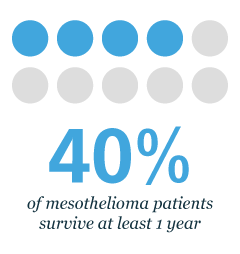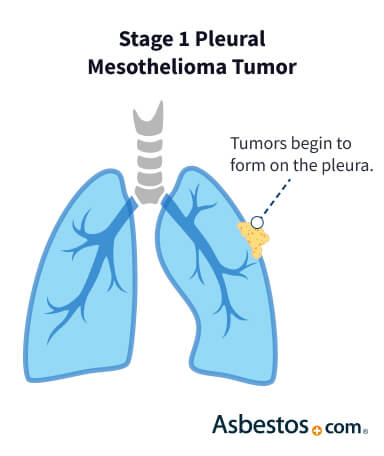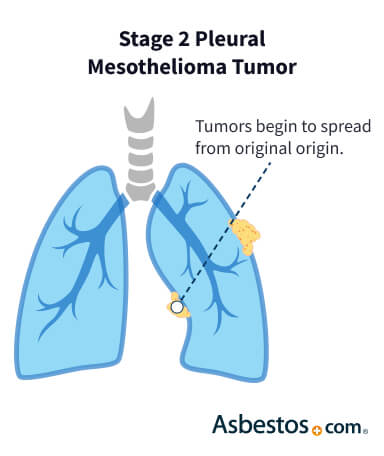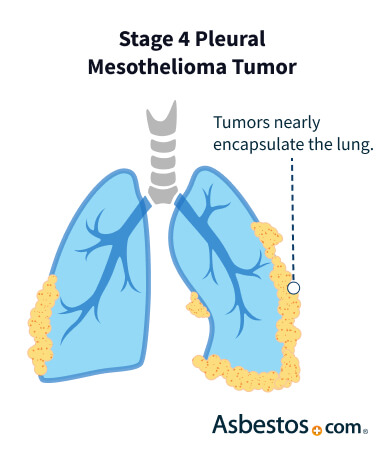Malignant mesothelioma is a rare, asbestos-related cancer. It forms on the protective tissues covering the lungs, abdomen and heart. Symptoms include coughing, chest pain and shortness of breath. Treatments combining surgery, radiation and chemotherapy improve survival and life expectancy.
Mesothelioma is a rare cancer caused by exposure to asbestos.
The disease forms on the mesothelium — a protective lining that covers the lungs, abdomen, heart and testes.
Tumors can be benign (noncancerous). But when tumors are cancerous, doctors call the disease malignant mesothelioma. It is often shortened to mesothelioma.
The American Cancer Society records about 3,000 new cases of mesothelioma each year in the U.S.
Leading Expert Dr. David Sugarbaker Explains Mesothelioma
 Mesothelioma specialist Dr. David Sugarbaker explains how mesothelioma develops.
Mesothelioma specialist Dr. David Sugarbaker explains how mesothelioma develops.
Causes
Asbestos remains the primary cause of mesothelioma.
The cancer develops when a person ingests asbestos, and it causes changes to a person’s DNA. Our genes are made of DNA. Some of the genes in our body control how cells grow, multiply and die. Changes in our genes may cause cells to divide out of control and may lead to cancer.
Development of Mesothelioma
-
A person inhales or swallows airborne asbestos fibers.
-
The asbestos fibers become lodged in the lining of the lungs, abdomen or heart.
-
The embedded fibers damage the mesothelial cells and cause inflammation.
-
Over time, tumors begin to form on the damaged mesothelium.
Read More About Mesothelioma Causes
Symptoms
Common Mesothelioma Symptoms
- Dry coughing
- Shortness of breath
- Respiratory complications
- Pain in the chest or abdomen
- Fever or night sweats
- Pleural effusion (fluid around the lungs)
- Fatigue
- Weakness in the muscles
These mesothelioma symptoms usually do not show until tumors have grown and spread. Mesothelioma latency is 20-50 years. That’s how long it takes from initial exposure to accurate diagnosis. For that reason, many people with mesothelioma are in their 60s or 70s.
You should talk to a mesothelioma specialist soon if you have a history of asbestos exposure and experience these symptoms. An early diagnosis may improve your prognosis and life expectancy.
Read More About Mesothelioma Symptoms

Free Mesothelioma Information Guide, Tailored to You
Select the diagnosis you or your loved one is facing and receive a free guide with the right information for you:
Who Is Most at Risk of Mesothelioma?
-
Veterans
Asbestos use in the military was widespread from 1940 to 1980. Veterans from all branches of the U.S. armed forces were at risk of exposure. Navy veterans are most at risk. This branch used the largest quantity of asbestos products.
-
Occupational Exposure
More than 75 occupations have exposed workers to asbestos. Auto mechanics, textile workers, steel mill workers, construction workers and firefighters are among the most at risk.
-
Secondary Exposure
Asbestos workers unknowingly carried asbestos fibers on their body and clothing. This resulted in secondary asbestos exposure among residents such as women and children.
Types of Mesothelioma
Oncologists name each type of mesothelioma by the location in the body where it develops.
The pleural and peritoneal types of mesothelioma are the most common. Pericardial accounts for 1 percent of cases. Another rare type is testicular mesothelioma. It represents less than 1 percent of all mesotheliomas.
Prognosis, symptoms and treatment options vary by type.
Prognosis

Source: Cancer.org
Younger patients and women have a better mesothelioma prognosis than older men. People diagnosed with peritoneal mesothelioma also have a higher chance of survival.
Patients eligible to undergo multimodal therapy, which is a combination of two or more standard-of-care treatments, have a better life expectancy and improved prognosis.
A patient’s mesothelioma cell type also plays a significant role in prognosis and life expectancy. The three types of cells include:
Epithelioid: These cells are the most responsive to treatment, which improves prognosis and life expectancy. They comprise 50 percent of mesothelioma diagnoses.
Sarcomatoid: These cells are the least responsive to treatment. Patients with this cell type have a poorer prognosis and shorter life expectancy. These cells comprise 10 percent of diagnoses.
Biphasic: A combination of epithelioid and sarcomatoid cells. This type is less responsive to treatment. But prognosis and life expectancy depends on the ratio of both types of cells. This type accounts for 30-40 percent of diagnoses.
How Long Do Mesothelioma Patients Live?
The life expectancy for most patients is about 12 months after diagnosis.
What Factors Affect Prognosis?
Stage and cell type of the cancer are the factors that most affect prognosis. Age, gender and patient’s asbestos exposure history also affect survival outlook.
How Can Patients Improve Their Prognosis?
Eating a nutrient-rich diet, undergoing cancer treatments, including multimodal therapy, and staying healthy can improve prognosis.
Learn how to improve your prognosis
The Four Stages of Mesothelioma

Stage 1
The cancer is localized. Surgery is most effective at this stage. Survival rate is higher. Median life expectancy at stage 1 is 22.2 months.

Stage 2
Tumors have started to spread from the original location into adjacent structures. Surgery is still an option. Median life expectancy at stage 2 is 20 months.

Stage 3
Cancer has progressed to a more advanced stage with spread into the regional lymph nodes. Surgery may still be an option. Median life expectancy at stage 3 is 17.9 months.

Stage 4
Cancer has spread extensively in the area where it developed. Chemotherapy and immunotherapy control symptoms and prolong survival. Median life expectancy at stage 4 is 14.9 months or less.
Importance of Finding a Mesothelioma Specialist
Mesothelioma is a rare cancer. It represents only 0.3 percent of all cancer diagnoses. Most doctors and oncologists have never encountered it.
A 2009 study published in the Journal of General Internal Medicine states that cancer care “requires the technical knowledge and skills of specialty physicians such as medical oncologists, surgeons and radiation oncologists.”
Specialty cancer doctors establish:
- Goals for treatment and prognosis
- Possible use of chemotherapy
- First type of treatment
- Possible participation in clinical trials
These are factors that impact a mesothelioma patient’s survival. That’s why finding a mesothelioma specialist is so important.
Finding a mesothelioma specialty center with experienced mesothelioma doctors is crucial to survival.
Dr. Jacques Fontaine, a world-renowned mesothelioma specialist, discusses mesothelioma exclusively with Asbestos.com.
Need Help Finding a Specialist?
Top Pleural Specialists
Top Peritoneal Specialists
Treatment Options
Quick Fact
More than 70 percent of mesothelioma patients undergo chemotherapy
Mesothelioma treatment helps patients live longer lives. But not every patient is eligible for each type of mesothelioma treatment.
The most common treatments for mesothelioma include:
Surgery: Offers greatest chance of survival. Usually used for diagnosis, tumor removal or palliative care to reduce pain. Patients with strong health and limited cancer spread are good candidates.
Chemotherapy: More than 70 percent of patients undergo chemotherapy. It uses powerful drugs to shrink tumors and kill cancer cells.
Radiation Therapy: Used to reduce pain from growing tumors. When combined with surgery and chemotherapy, it reduces risk of local recurrence. It can be used at any cancer stage.
Immunotherapy: This experimental treatment boosts the immune system to fight the cancer. Primarily used in clinical trials.
Multimodal Therapy: A combination of two or more treatments. Clinical studies show this approach improves survival rates.
HIPEC: A multimodal treatment for peritoneal mesothelioma patients. Surgery is first used to remove as many tumors as possible. Heated chemotherapy is then applied to the abdominal cavity to destroy remaining cancer cells.
Palliative Treatments: May include surgery, radiation, chemotherapy or HIPEC. The purpose is not curative care. Instead, the goal is to reduce pain and improve quality of life. Good for any mesothelioma patient.
Words from People We’ve Helped
“Thank you for the doctor referral info. We met with the doctor and came away with what seemed like a weight lifted.”
Clinical Trials and Emerging Treatments
Clinical trials offer mesothelioma patients access to experimental therapies. They also provide scientific and medical information for researches to develop new treatments. Patients in clinical trials also receive excellent medical care.
Learn More About Clinical Trials
Alternative Treatments
Herbal medicines, mind-body therapies, holistic healing and other complementary therapies may benefit patients.
Mesothelioma Lawsuits and Financial Assistance
$180,000
The median value for mesothelioma claims, according to a 2010 report from the RAND Corporation, a nonprofit institution that conducts research and analysis on asbestos bankruptcy trusts.
Why Should You File?
Many companies that produced, distributed or used asbestos products knew it was deadly. But they neglected to warn their employees. Filing a lawsuit can help mesothelioma patients cover lost wages, medical expenses and other costs.
Who Can File a Lawsuit?
A person with mesothelioma can file a personal injury lawsuit. Mesothelioma lawyers file these against companies responsible for their client’s asbestos exposure. Families can file wrongful death claims when a loved one dies of mesothelioma.
How Do I File a Lawsuit?
Qualified mesothelioma attorneys can help you decide when to file a lawsuit. They can also guide you through the process. Time is of the essence because statute of limitations may expire. A mesothelioma lawyer will review your case so you receive the highest compensation.
Other Types of Financial Assistance
- VA Claims: Military veterans can file asbestos-related claims through the U.S. Department of Veterans Affairs.
- Medicare and Medicaid: Government aid for older patients or those with limited income.
- Workers’ Compensation: Financial help may be available to people exposed to asbestos on the job.
Mesothelioma Support
Support is available for mesothelioma patients, survivors and loved ones in many forms.
- Mesothelioma Support Groups: Offer patients and survivors a safe place to share experiences.
- Grief Support: Counseling sessions and grief support groups can bring peace of mind. They can also provide the coping skills needed to grieve for the loss of a loved one.
- Medical Support: A complete medical team with a mesothelioma specialist, dietitian, patient advocate and others can improve prognosis.
The Mesothelioma Center’s monthly online support group meets every second Wednesday. Licensed mental health counselor Dana Nolan runs the support group. Patients and survivors can share their experiences with others on a similar cancer journey.

I do accept as true with all the ideas you have
presented on your post. They’re very convincing and will definitely work.
Nonetheless, the posts are too brief for newbies. May just you please prolong them a bit from next time?
Thank you for the post.